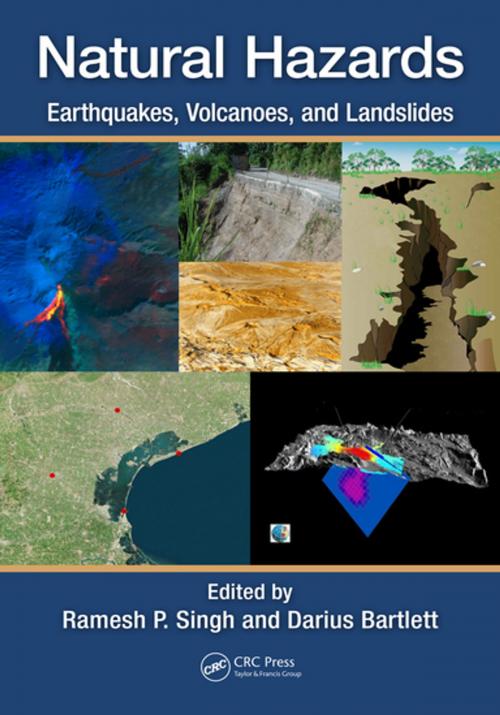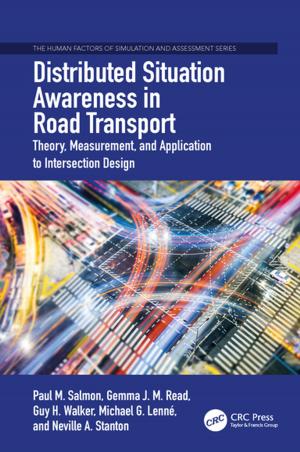Natural Hazards
Earthquakes, Volcanoes, and Landslides
Nonfiction, Science & Nature, Technology, Engineering, Civil, Science, Earth Sciences, Social & Cultural Studies, Social Science| Author: | ISBN: | 9781351681193 | |
| Publisher: | CRC Press | Publication: | March 22, 2018 |
| Imprint: | CRC Press | Language: | English |
| Author: | |
| ISBN: | 9781351681193 |
| Publisher: | CRC Press |
| Publication: | March 22, 2018 |
| Imprint: | CRC Press |
| Language: | English |
Over the years, the interactions between land, ocean, biosphere and atmosphere have increased, mainly due to population growth and anthropogenic activities, which have impacted the climate and weather conditions at local, regional and global scales. Thus, natural hazards related to climate changes have significantly impacted human life and health on different spatio-temporal scales and with socioeconomic bearings. To monitor and analyze natural hazards, satellite data have been widely used in recent years by many developed and developing countries. In an effort to better understand and characterize the various underlying processes influencing natural hazards, and to carry out related impact assessments, Natural Hazards: Earthquakes, Volcanoes, and Landslides, presents a synthesis of what leading scientists and other professionals know about the impacts and the challenges when coping with climate change.
Combining reviews of theories and methods with analysis of case studies, the book gives readers research information and analyses on satellite geophysical data, radar imaging and integrated approaches. It focuses also on dust storms, coastal subsidence and remote sensing mapping. Some case studies explore the roles of remote sensing related to landslides and volcanoes. Overall, improved understanding of the processes leading to these hazardous events will help scientists predict their occurrence.
Features
-
Provides information on the physics and physical processes of natural hazards, their monitoring and the mapping of damages associated with these hazards
Explains how natural hazards are strongly associated with coupling between land–ocean–atmosphere
Includes a comprehensive overview of the role of remote sensing in natural hazards worldwide
Examines risk assessment in urban areas through numerical modelling and geoinformation technologies
Demonstrates how data analysis can be used to aid in prediction and management of natural hazards
Over the years, the interactions between land, ocean, biosphere and atmosphere have increased, mainly due to population growth and anthropogenic activities, which have impacted the climate and weather conditions at local, regional and global scales. Thus, natural hazards related to climate changes have significantly impacted human life and health on different spatio-temporal scales and with socioeconomic bearings. To monitor and analyze natural hazards, satellite data have been widely used in recent years by many developed and developing countries. In an effort to better understand and characterize the various underlying processes influencing natural hazards, and to carry out related impact assessments, Natural Hazards: Earthquakes, Volcanoes, and Landslides, presents a synthesis of what leading scientists and other professionals know about the impacts and the challenges when coping with climate change.
Combining reviews of theories and methods with analysis of case studies, the book gives readers research information and analyses on satellite geophysical data, radar imaging and integrated approaches. It focuses also on dust storms, coastal subsidence and remote sensing mapping. Some case studies explore the roles of remote sensing related to landslides and volcanoes. Overall, improved understanding of the processes leading to these hazardous events will help scientists predict their occurrence.
Features
-
Provides information on the physics and physical processes of natural hazards, their monitoring and the mapping of damages associated with these hazards
Explains how natural hazards are strongly associated with coupling between land–ocean–atmosphere
Includes a comprehensive overview of the role of remote sensing in natural hazards worldwide
Examines risk assessment in urban areas through numerical modelling and geoinformation technologies
Demonstrates how data analysis can be used to aid in prediction and management of natural hazards















